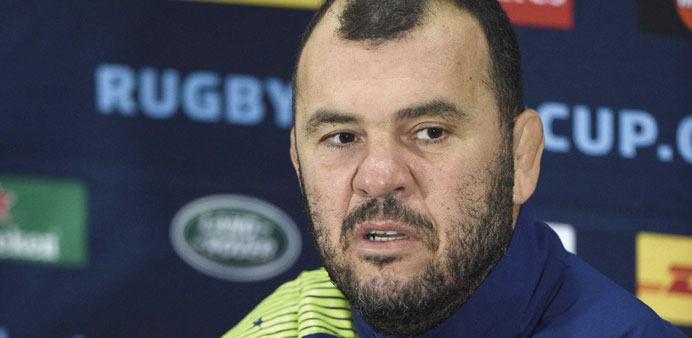AFP
London
Michael Cheika marked a year as Australia coach yesterday having unified a fractious squad, restored pride in the green and gold jersey and brought the Wallabies back to winning ways.
The 48-year-old Cheika will watch his side play Argentina in a World Cup semi-final on Sunday hoping he has mixed the magic ingredients to make him one of the ultimate rugby alchemists and deliver the Webb Ellis Trophy come October 31.
He has pushed all the barriers to the limits since he picked up the debris left from the short but catastrophic Ewen McKenzie reign.
McKenzie’s 15 months in charge was marred by scandal, split the squad into factions and saw results on the pitch take a hit.
Under Cheika, Australia beat New Zealand on the way to winning the Southern Hemisphere’s Rugby Championship this year. In England, they are vying with New Zealand and South Africa to become the first country to get three world titles.
Cheika—whose Lebanese father arrived in Sydney in 1950 with barely a penny in his pocket—set a new tone with the Australia players right from the start by lancing the boil that had festered during the McKenzie era.
He recalled badboy fullback Kurtley Beale, whose lewd texts to team official Di Patston sparked the row that tore apart the squad. Beale, who knew Cheika from the NSW Waratahs, had been heavily fined, Patston quit and the scandal played a key role in McKenzie’s resignation.
Cheika used his trademark forthright language when talking about Beale.
“I don’t know, I think when he (Beale) came to the Waratahs I never claimed I was going to be his social worker,” said Cheika last November before relating how he had dealt with the troubled player.
“Honesty, straightforwardness, directness, putting him exactly in the picture of what’s required and what’s not needed, and I’ve found that that works to get the best out of him and also a really good, honest relationship.
“No one’s ever going to be 100 percent perfect, me included.”
This attitude has also been seen in his dealing dealing with the boozing culture. The Cheika way is ‘treat them like adults’ so long as players do not take advantage of it.
Wallaby shakeup
There were no holds barred again this week when Cheika condemned the criticism of Craig Joubert, the referee fingered by World Rugby for making a mistaken penalty award to the Wallabies in the last minute of their quarter-final with Scotland.
This has helped bring the squad together, as has his moves to instill national pride. He sat all the players down as a group but ask them what they as individuals thought the Wallaby jersey meant to them as a person.
“His (Cheika) system has a different effect (to previous coaches) in that we have an identity of what we want to be and we work towards that every day in respect of the team and the individual,” said lock Dean Mumm.
“As individuals we want to be humble and genuine.
“Hopefully people can start to see that is who we are because we have worked very hard to get to this stage.”
Mumm is one of those players who has benefited enormously from another facet of Cheika’s reign.
The coach decided that to win the World Cup he would assume the roles of Yul Brynner and Lee Marvin in the “Magnificent Seven” and “Dirty Dozen” and go out and get the best people to achieve their respective aims.
He pushed the Australian Rugby Union to relax their rules on not selecting foreign based players who had 60 caps. That brought back the likes of Toulon duo Matt Giteau and Drew Mitchell into the fold. Cheika encouraged those like Mumm did not have 60 caps to return to Australia with the hope of making the squad.
Ace second rower Kane Douglas was another incorrigible Cheika pursued when the player was happy living in Dublin and playing for Leinster.
“I thought he was going to take an AVO (intervention order) out on me because I kept ringing him up about coming back the minute he left,” said Cheika. Needless to say he got his man in the end.
Cheika brings oodles of emotion to the table but flanker Scott Fardy says it is extremely constructive.
“He brings a lot of passion and it comes out in the players,” says Fardy.
“He drives a lot of emotion through you and the guys express that on the pitch and this has been a really useful weapon for us to have.”

